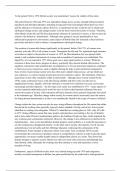‘In the period 1964 to 1979, British society was transformed’ Assess the validity of this claim.
The period between 1964 and 1979 saw undoubted change across society, through both government
legislation and individual attitudes, stemming in large part from increasingly liberal post-war views
and the influence of American culture. However, a transformed society would be one in which total
ideological change occurs, and change reaches even the most conservative parts of society. Therefore,
while Britain of the 60s and 70s does demonstrate elements of a permissive society, it fails to meet the
criteria to be defined as ‘transformed’. Although some groups in society spearheaded or were
influenced by progressive movements, many aspects of British daily life remained as they had been
previously and there is little evidence of comprehensive ideological change.
The position of women did change significantly in this period; before 1964 75% of women were
married, with only 20% of all women in work. Throughout the 60s and 70s, significant legal measures
were taken to improve the position of women: in 1975 the Discrimination Act was passed which
aimed to end workplace harassment of women and an equalities Commission was established. The
Equal Pay Act was enacted in 1975 whose goal was to grant equal salaries to women. While the
existence of these laws shows progress in theory, practically they showed limited effectiveness. The
equalities commission only launched nine investigations in a 10-year period and employers continued
to find ways to pay women less, such as slightly altering the tasks women performed compared to
those of men. Issues facing women were also often more complex than just pay - private child care
was expensive, so women staying at home proved a less expensive option. The limitations of the laws
passed also reveal wider continuity within societal trends – although more women worked by the
1970s, many continued to leave work after having children and their work was still seen as
supplemental income. Equally, while the influence of second-wave feminism was seen, and women
increasingly protested injustice – the first rape crisis center was established in 1971 – many aspects of
society remained traditionalist and it would be naive to believe that feminism influenced the most
conservative parts of society. Girls education still had a domestic focus and girls frequently left school
at the minimum age. Therefore change within society for women doesn't necessarily meet the criteria
for being deemed transformative, in that it was undoubtedly limited in the scope of women it affected.
Change within the class system can also be seen, rising affluence throughout the 50s meant that within
this period the working class generally enjoyed a better standard of living, and in fact, fewer people
identified as working class altogether. While 67% identified as working glass in 1961, only 43% did
in 1971. Rising affluence meant that more people could purchase cars leading to the rise of Suburbs
and in turn, under Wilson's modernization policies, the building of high-rise flats, which impacted the
way working-class communities interacted. However, this change is not sufficient to be deemed to be
transformation – rises in rent and inflation limited people's social mobility so it would be inaccurate to
say the working class disappeared entirely. At the other end of society, the majority of civil servants
and politicians were privately and then Oxbridge educated, evidencing the continuation of the
establishment. Some attempts at education reform were made, Tony crosslands 10/65 circular
recommended the conversion of grammar schools to comprehensive schools in order to provide equal
opportunities, but many wealthy people turned to independent schools as a result. This shows that
despite attempts to equalise society, Britain was still very much class-conscious and although class
lines blurred a little, ultimately the working class did continue to exist and experience a lower
standard of living.
Furthermore, aspects of British society show very limited change up until 1970 and emigration
actually exceeded immigration in Britain, but panic proliferated by the media led to widespread fear




